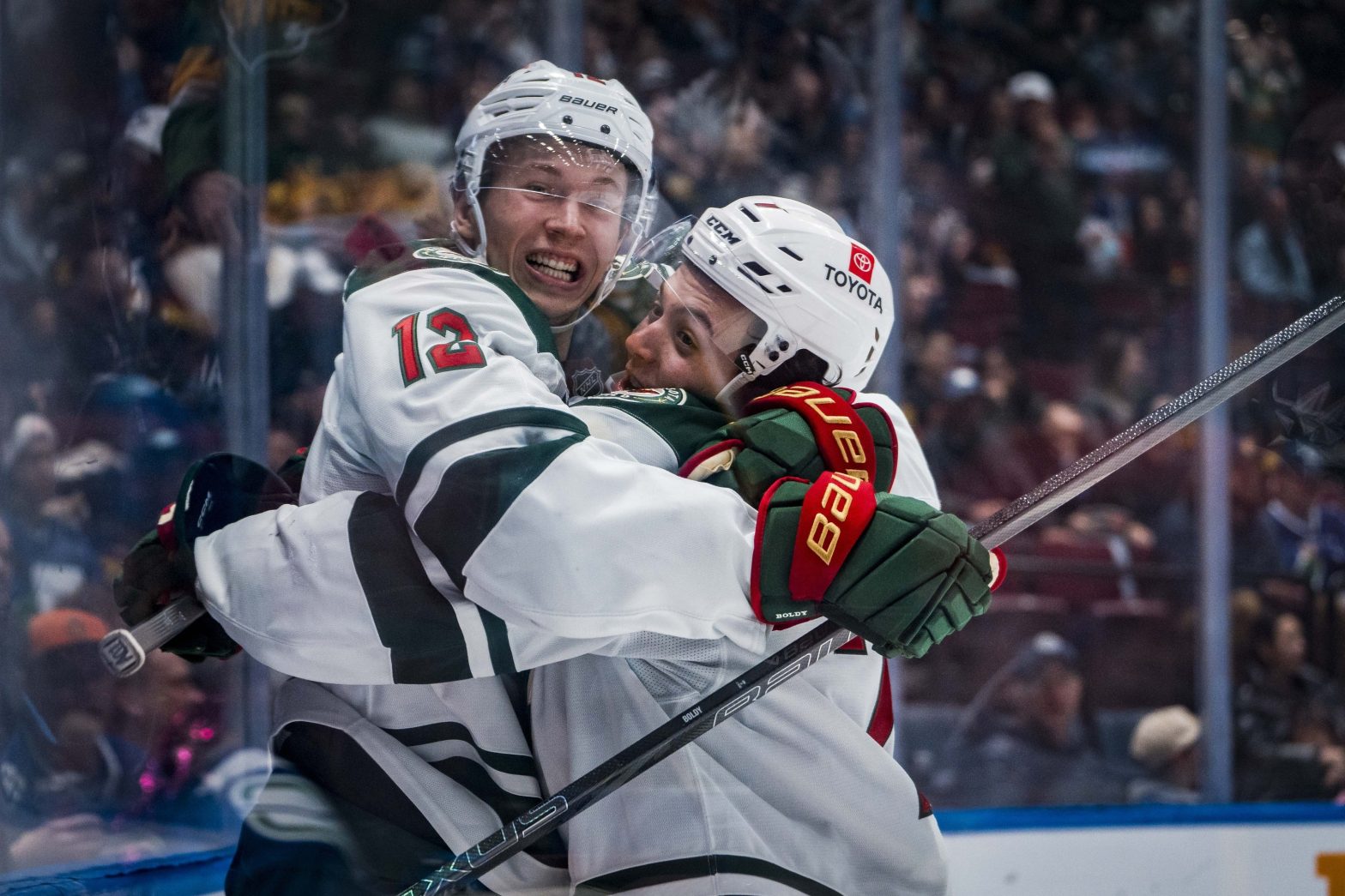The universal view of the Zach Parise and Ryan Suter buyouts is that they were an anchor around the neck of the Minnesota Wild. That’s absolutely true, you can’t argue that Minnesota’s upside wasn’t capped by having $15 million or so in dead money these last two years. But even downsides can have upsides, and for Bill Guerin, the upside of having no money to play with is that it’s pretty hard to make mistakes.
Sure, you don’t get to have those splashy summer headlines from signing free agents, but those tend to curdle quickly. Look at the Seattle Kraken, who threw center Chandler Stevenson $44 million last summer out of desperation for depth down the middle. Or pop some popcorn and get ready for Year 2 of the Nashville Predators weighing down their team with big deals for aging Steven Stamkos, Jonathan Marchessault, and Brady Skjei.
By default, Guerin avoided those landmines. That’s not to discredit what he accomplished during the worst of the Wild buyouts. He had little margin for error in those four seasons, and he piloted his team to the playoffs in three out of four seasons. Regardless of whether or not you think that’s what the play should have been, it’s very impressive work.
Now the field has opened to Guerin, with all of the privileges and risks that will entail. And as efficient as Guerin has been over these last four years, it’s hard not to be a bit nervous about this. We saw him step on one of those landmines by giving Yakov Trenin a four-year, $3.5 AAV contract last summer, even with the team cap-strapped. There’s also the fact that the Vancouver Canucks apparently saved Guerin from giving Brock Boeser a risky, lucrative, long-term deal.
That’s a concern for a team that’s starting to see a few cracks in their spending, as it is. The Wild moved up from 19th to 11th in the NHL in contract efficiency, per Dom Luszczyszyn’s annual ranking at The Athletic. It’s encouraging, but it doesn’t tell the whole story. A lot of heavy lifting was done by $15 million of dead cap turning into less than $2 million, plus Matt Boldy’s value going into the stratosphere when weighted against his $7 million price tag.
Last season, the Wild had just seven contracts that Luszczyszyn projected to produce negative value. Now that number is up to nine, and the average length of those contracts extends through the next three years (two years, if you exclude Brock Faber’s eight-year extension that kicked in last month). This includes every defenseman except for Jake Middleton. The list of likely-negative-value deals also includes two of Guerin’s extensions from Fall 2023 (Ryan Hartman and Marcus Foligno), last summer’s “splash” signing (Trenin), and this summer’s free agent of note (Nico Sturm).
No team is immune to bad contracts, and the good teams rely on having some good, or even great deals to cancel out the bad. The Wild are in the positive, overall. But that’s with Kirill Kaprizov making $9 million against the cap. Next fall, that turns into a deal which will be much closer to his value. Heck, he might even be the highest-paid player in the league. There goes a $5 million cushion to absorb a bad hit or two.
The salary cap rising also means that the Wild are getting their cap relief at a time when the price of players is set to skyrocket. That might help the longer-term negative-value contracts like Faber (for now), Brodin, Foligno, and Trenin age a bit more gracefully, but it presents a new set of problems. We’re already seeing the conflict between the Wild’s price points and the market in their stalemate with Marco Rossi.
Getting $13 million of flexibility would have gone a lot further if the cap was still flat, as it’s been for the last four years. Instead, the Wild are giving about half of that to Kaprizov in a year, and $8 million isn’t going to go terribly far going forward. Heck, they might spend a bunch of it on Rossi.
And if not Rossi, there’s the next free agent opportunity, especially since the Wild are hoping to eventually deliver on “Christmas Morning.”
How can Guerin stay smart, flexible, and efficient going forward? A big part of that puzzle is in place, at least for the next couple of seasons. Entry Level Contracts for Zeev Buium and Danila Yurov mean that the Wild will have key contributors making very little money for the next two years. David Jiříček is in the final year of his ELC next year, and doesn’t figure to make a ton of money on his next deal, unless things go really well.
But that’s only part of the formula, and that’s only temporary. Guerin is going to have to navigate the seas of free agency while having a full arsenal of cap space without taking on too much water from bad deals. Making the best of a limited situation is a skill, but now we’ll have to see how Guerin’s cap management translates to a new environment.
Think you could write a story like this? Hockey Wilderness wants you to develop your voice, find an audience, and we’ll pay you to do it. Just fill out this form.
https://hockeywilderness.com/news-rumors/minnesota-wild/will-more-money-create-more-problems-for-bill-guerins-wild-r30854/
